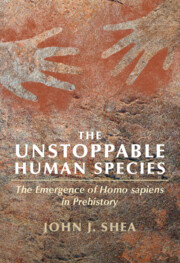Book contents
- The Unstoppable Human Species
- The Unstoppable Human Species
- Copyright page
- Dedication
- Contents
- Figures
- Tables
- Boxes
- Preface
- Acknowledgments
- Chapter 1 Introduction
- Chapter 2 Hard Evidence
- Chapter 3 Who Are These People?
- Chapter 4 How Did They Get Here?
- Chapter 5 Ancient Africans
- Chapter 6 Going East
- Chapter 7 Down Under
- Chapter 8 Neanderthal Country
- Chapter 9 Going North
- Chapter 10 A Brave New World
- Chapter 11 Movable Feasts
- Chapter 12 Distant Horizons and Stars Beckon
- Chapter 13 Unstoppable? Human Extinction
- Chapter 14 Conclusion
- Book part
- Glossary
- Bibliography
- Index
Chapter 11 - Movable Feasts
Food Producers and Migrations
Published online by Cambridge University Press: 16 March 2023
- The Unstoppable Human Species
- The Unstoppable Human Species
- Copyright page
- Dedication
- Contents
- Figures
- Tables
- Boxes
- Preface
- Acknowledgments
- Chapter 1 Introduction
- Chapter 2 Hard Evidence
- Chapter 3 Who Are These People?
- Chapter 4 How Did They Get Here?
- Chapter 5 Ancient Africans
- Chapter 6 Going East
- Chapter 7 Down Under
- Chapter 8 Neanderthal Country
- Chapter 9 Going North
- Chapter 10 A Brave New World
- Chapter 11 Movable Feasts
- Chapter 12 Distant Horizons and Stars Beckon
- Chapter 13 Unstoppable? Human Extinction
- Chapter 14 Conclusion
- Book part
- Glossary
- Bibliography
- Index
Summary
ch 11: This chapter considers the relationship between food production and migration. Before Holocene times (> 12 Ka) archaeological evidence consistently shows that human population movements were dispersals and not migrations. People moved into new habitats either as individuals or in small groups, reconfiguring their economies and social identities in their destinations. From mid-Holocene times onward (after 4–8 Ka), however, the archaeological record begins to show increasing evidence for migrations. Migrating humans took their food and their culture, their “movable feasts,” with them. This chapter argues that recent human migrations result from food production using domesticated plants and animals. It describes how food production altered some of humanity’s responses to the basic six survival problems in ways that not only encourage migrations but also make them easier for archaeologists to detect, albeit within a limited chronological “window of visibility.” A case study from sub-Saharan Africa shows that archeologists can detect prehistoric migrations, but we have to ask different questions about them than traditional “who questions.”
Keywords
- Type
- Chapter
- Information
- The Unstoppable Human SpeciesThe Emergence of Homo Sapiens in Prehistory, pp. 230 - 255Publisher: Cambridge University PressPrint publication year: 2023

